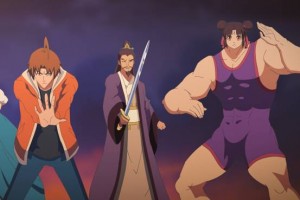Japanese manga promotes juvenile delinquency, violence, and sex — these were some of the reasons that the Chinese Ministry of Culture used to outright ban 38 Japanese manga and anime. But some are beginning to explore whether similar Chinese-produced materials would be held to the same standard and whether they can succeed in a country whose strict censorship policies actively stifle free expression.
A recent acquisition of U17.com — one of China’s top original web comic hosting sites — by Guangdong Alpha Animation & Culture Company Ltd. for $141 million is an attempt to find ways to bring Chinese animation and comics to a more adult readership. The animation company holds the rights to the popular Chinese-produced family-friendly television show Pleasant Goat and Big Big Wolf, which has seen great success in China by targeting a younger demographic (and has itself run afoul of censors as a result). Amidst the rise in interest for more adult-oriented content, like the Japanese series Death Note and Attack on Titan, the company is banking on more mature and explicit materials, specifically those produced domestically.
One adult comic from U17.com that was recently adapted for the big screen, 100,000 Bad Jokes, focuses on satirizing Chinese and Western pop culture, from Superman to Pinocchio, and has been very positively received by the Chinese public. It isn’t Naruto or High School of the Dead, but the kind of humor it embraces and visuals it shows have so far been deemed appropriate by the Chinese ministry despite incorporating elements that closely resemble Japanese manga and anime. “We know what the domestic standard is and we censor every work before uploading,” said Zhou Jingqi, founder of U17.com, in a recent interview with China Real Time. “We ask cartoonists to revise those parts we deem improper.”
It would seem that even Chinese cartoons are evaluated for violence, explicit sex, or “problematic” political and moral viewpoints before being produced,
but they are changed before they are made available for public consumption — a fact that could explain further China’s unease with the importation of manga and anime from Japan, which is not being regulated at the creative stage. If there is content that “might stir unease” it is censored. “Definitely no nude scenes, and scenes with clothes that are too revealing are not okay, either,” noted Zhou.
Although Chinese creators are trying to reach an audience looking for comics and cartoons that fall in line with a more adult mindset and parallel what they have become accustomed to with imported materials from Japan, that task is more difficult because censorship policies directly impact the creative process itself within the country. Zhou and Chinese President Xi Jinping have emphasized that the censorship is an attempt to cultivate cartoons that inspire imagination. But with the large sums of money being moved among studios to turn adult audiences on to Chinese-produced content, it seems some censorship is intended to excise non-Chinese materials that compete with domestic products and do not fall in line with the kind of “China” that the government is trying to promote.
Help support CBLDF’s important First Amendment work in 2015 by visiting the Rewards Zone, making a donation, or becoming a member of CBLDF!
Contributing Editor Caitlin McCabe is an independent comics scholar who loves a good pre-code horror comic and the opportunity to spread her knowledge of the industry to those looking for a great story!
